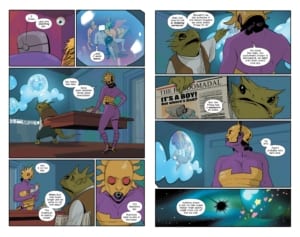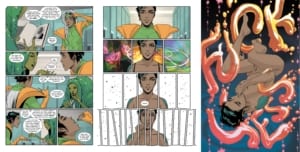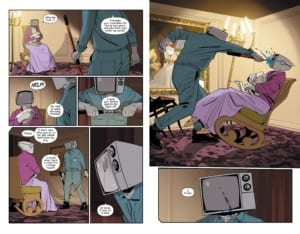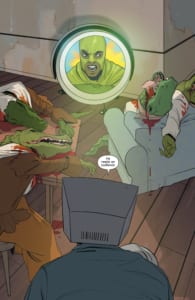When Image Comics took its first bold, super-edgy steps back in the 90’s, the departure from its elders in Marvel and DC was mostly aesthetic. Its statement of independence was a shift of the palette, featuring extra gore, sex, and Rob Liefeld (ugh). But behind a dorkish adolescent stage, there may be a brilliance waiting to come out. I’d dare say it turned out be such a case, as Image has reached a state of maturity. Newer titles have done more than diversify the publisher’s early style. They have gone and introduced fresh and colourful narratives and styles with quality comparable to DC‘s Vertigo. It’s no longer a schism from the elders, but a whole world of its own.
In Saga‘s case, there is so much in terms of freshness. In particular, I would like to derive some attention to the comic’s diegetic ways. The fractured temporality and the twofold narration via a character that ‘exists’ in both present and future do more than just tell a story. It generates anticipation in the reader for events that appear almost bound to happen. This recurrent deprived ability to ‘be in the moment’ extends the sensation of unease that the characters experience at being fugitives to the reader. As the present and the future converge into one, we get a richer comprehension of the events.
So, now that we know Alana and Marko will split, we have to see how it happens, one moment at a time.
Issue #20
“Just let me try a taste”
The issue’s cover is really an extension of the atmosphere we got from last issue. We know the comic’s all about family, but in this occasion, the cover can function as a deliberate device to remind us what’s at stake. Or more accurately, to remind us what we’ll be losing in the future. Perhaps it’s meant to set the field for a massive tone-break. After all, what better way to undo the tender image of fatherly love than by a visit to Sextillion? Do keep in mind, one of our beloved characters, Sophie, has been enrolled for services here. Fortunately, Prince Robot IV is nowhere near as vile as to hire a child’s services during his stay. Mama Sun’s little helper insists that they get the word out that PRIV is not missing.

However, she is a ‘consummate professional’, which means that the client’s privacy is paramount. So long as the money keeps rolling in, it doesn’t matter if the client’s presence is required somewhere else. Not even if the royal birth of his son has been printed on the papers. Business is business, and you can’t negotiate with that. In as inexorable a manner as that, you also can’t negotiate with a little kid’s stomach. Back on Gardenia, Little Hazel climbs into her parents’ bed to screech for breakfast, waking her father in the process. Marko wakes up to find that Alana has gone to rehearsal early, so it’s up to him to do breakfast duties for once. After Izabel tells him how Hazel likes her waffles, he contemplates taking his daughter to Ginny’s dance studio.
Meanwhile, Alana hones her role as Zipless in a skit about employers disgruntled about wages at an office, as you do. As a contrast from last issue, her performance fares considerably better, even earning some praise from co-actors and the showrunner. However, a peculiar choice of words from one of her peers results in some locker room banter. Everybody loves banter, but it can get uncomfortable when it surrounds your background. The other actors had some theories on Alana’s past. One figured she fought as a conscript for Wreath, and another thought she was a former Freelancer. Given Alana’s actual background, she stoically tries to draw the topic away from her. Enter Yuma to quickly defuse the situation.
As the other actors leave the locker room, Alana and Yuma engage in conversation about the nature of the Circuit. Here we get some understand of why Yuma and Heist ever got together, as she too has a pretty nuanced view of the craft. She remarks that some arts have the potential of changing how people view and feel about the world and themselves. On the other hand, she’s also not naive about the worth of the Circuit, which has a more fleeting effect. Much like a disposable bad flick, the Circuit works on the level of moods and temporary feelings. It’s a temporary balm against a much more unforgiving reality; mere escapism. Here is where Yuma and Heist differ; short term that gets her bliss against long term that got him dead.

This view of things extends to a particular personal taste. Yuma loves drugs, and apparently so does half of the troupe. Since Alana has been considerably stressed as of late, she won’t say no to a quick high. Yuma warns her that her drug of choice, Fadeaway, is pretty strong, but Alana takes one tab still. The effect is similar to that lovely cross-breed of Ecstasy and LSD, which we’ve seen in comics like The Wicked + The Divine. Safe to say, knowing what we do now, from Hazel’s retrospective narration, the bliss comes with a sour tint. As reader, one can’t help but wonder if this will be the start of a plunge into a chaos, lending to the future separation of Alana and Marko.
Alas, while mum enjoys one kind of lights, little Hazel enjoys another at Ginny’s studio. While she learns to dance by following floating glowing stars, Marko and Ginny talk about adult stuff. We learn that Ginny’s husband is on the road most of the time. Shortly after, Hazel calls the dance teacher ‘ugly’ in that particular way kids do about people other than their mummies or daddies. One could say that’s an instinctive protection of the family nucleus; it’s also a little rude. After Marko gets Hazel to apologise, Ginny gets him to dance with her to teach by example. Thusly, in as much as how we got the impression of a dangerous liberty from Alana, we get one now from Marko. It may be that the separation to come will result through the doing of one, or both.

Yet, somewhere else, another family is about suffer a greater, quicker fracture even. This will occur in the Robot Kingdom, in the royal bosom for the newborn little prince. Dengo, the custodian walks in on the Princess and her baby while she cradles him to sleep. He approaches with unmistakably baleful intentions, and a blade. He assures the Princess that he won’t harm the child, for he too was a father. His son, Jokum, died of dysentery. The Kingdom’s doctors would only do so much for the boy, however. Since he and his father were commoners, and without insurance (shit gets real, eh?), the boy’s life was forfeit. For this, and the living conditions enabled by the monarchy, Dengo murders the Princess.

Doing honour to his promise, Dengo won’t harm the little baby. In fact, he has plans for him to help all the children in the Robot Kingdom, regardless of bloodline. His plan involves the Open Circuit. So, we got on our hands another sympathetic baddie in – this time unknowingly – direct trajectory with Alana, Marko and Hazel. Although it’s pretty early still, this will undoubtedly spell trouble. However, we also have on our hands a bitter package. Parental abandonment for one child, possible adultery and dangerous vices looming on another’s parents. It’s broken home hour. Continue keeping it real, Saga. For the sake of beauty, fiction can sometimes take on the nasty bits of life.

Saga Issue #20 Credits
Writer: Brian K. Vaughan
Artist: Fiona Staples
All images are courtesy of Image Comics

